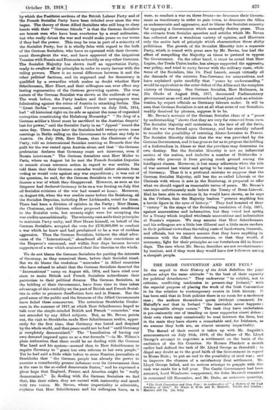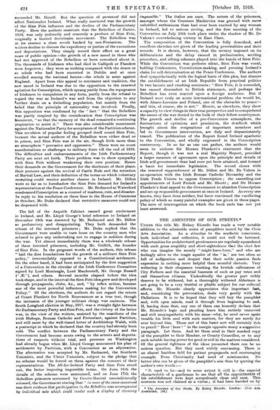THE IRISH CONVENTION- AND SINN FEIN.* IN the sequel to
their History of the Irish Rebellion the joint authors adopt the same attitude " to the best of their capacity for political detachment." They endeavour " to exhibit, not to criticize, conflicting tendencies in present-day Ireland," with the especial purpose of placing the work of the Irish Convention in its due relation to contemporary events in Irish history. It has been said that in Irish politics there is no room for a moderate man ; the authors themselves quote (without comment) Dr. Mahaffy's mot that in Ireland " the inevitable never happens ; the impossible always occurs." The task they have undertaken is pre-eminently one of treading on ignee suppositoe cineri doloso ; their own views may occasionally be read between the lines, but in the main they have shown a remarkable and, for Irishmen, as we assume they both are, an almost uncanny impartiality. The thread of their record is taken up with Mr. Asquith's announcement on July 28th, 1918, of the failure of Mr. Lloyd George's attempt to negotiate a settlement on the basis of the exclusion of the Six Counties. Sir Horace Plunkett a month earlier had defined the task of Mr. Lloyd George as threefold ; to dispel any doubt as to the good faith of the Government in regard . to Home Rule ; to put an end to the possibility of civil war ; and to improve the chances of a satisfactory final settlement. Mr. Lloyd George failed, and no serious attempt to grapple with this task was made for a full year. The Castle Government had been restored, Lord Winatorne reappointed, Sir John Maxwell remained in command till November, and Mr. Duke, an unknown quantity, • The Irish Convention and Sinn Fein: in continuation of "4 History of the huh Rebellion of 1016." By Warre B. Wells sad ^N. Marlowe. Dublin and Loudon : Manuel and Co. [is. net.[ succeeded Mr. Birrell. But the question of personnel did not affect Nationalist Ireland. What really mattered was the growth of the Sinn Fein influence and the decline of the Parliamentary Party. Here the authors maintain that the Rebellion of Easter, 1916, was only indirectly and remotely a product of Sinn Fein, originally a limited doctrinaire movement. The Rebellion was- in its essence a slum revolt backed by neo-Fenianism. The writers decline to discuss the expediency or justice of the executions and deportations. They simply record their effect on a great mass of public opinion—the growth of a new mood in those who bad not approved of the Rebellion or been consulted about it. The thousands of Irishmen who had died in Gallipoli or Flanders were forgotten ; they were as nothing compared with the dozen or so rebels who had been executed in Dublin and at once enrolled among the national heroes—the rebels in anus against England. Apart from this appeal to sentiment and tradition, the new mood in Ireland was due to the opposition to the renewed agitation for Conscription, which sprang partly from the repugnance of Irishmen to compulsion in any form, partly from the refusal to regard the war as Ireland's war and from the objection to any further drain on a dwindling population, but mainly from the belief that the principle of nationality was involved. Finally, this opposition was confirmed by the " fact " that the Rebellion was partly inspired by the consideration that Conscription was imminent, " so that tho memory of the dead remained a continuing inspiration to resist it." There was also considerable resentment against the Nationalist Party for acceptance of the Partition scheme. This revulsion of popular feeling grouped itself round Sinn Fein, because the actual authors of the Rebellion were either dead or in prison, and Sinn Fein was in the air, though little more than an atmosphere " pervasive and oppressive." There were no overt manifestations or challenges to military force till the end of 1916. The difficulties and embarrassments of the Irish Parliamentary Party are next set forth. Their problem was to show sympathy with Sinn Fein without weakening their own position. Hence their demands on the Government for the disclosure of their plans, their protests against the revival of Castle Rule and the retention of Martial Law, and their definition of the terms on which voluntary recruiting could receive another chance in Ireland. Mr. Dillon went so far as to foreshadow the Sinn Fein demand for Ireland's representation at the Peace Conference. Mr. Redmond at Waterford eondemnedConscription as a counsel of madness, ruin, and disaster. In reply to his resolution on these lines in the House of Commons in October, Mr. Duke declared that restrictive measures could not be dispensed with.
The fall of the Asquith Cabinet caused great excitement in Ireland, and Mr. Lloyd George's brief reference to Ireland on December 19th was resented by Mr. Redmond and Mr. Dillon as perfunctory and disappointing. They both demanded the release of the interned prisoners ; Mr. Duke replied that the Government were unable to turn loose on the country men who refused to give any undertaking not to engage in sedition during the war. Yet almost immediately there was a wholesale release of these interned prisoners, including Mr. Griffith, the founder of Sinn Fein. In the pregnant words of the authors, this release " laid the first foundations for the growth of a militant Sinn Fein policy," irreconcilably opposed to a Constitutional settlement.. On the other hand, it had been anticipated by the first suggestion of a Convention in the circular of the Irish Conference Committee signed by Lord Monteagle, Lord Macdonnell, Mr. George Russell (" IE."), and others. Several months elapsed before the idea took shape, and in the interval the Sinn Fein idea grew and developed through propaganda, clubs, &c., and, " by reflex action, became ene of the most powerful influences making for the Convention Policy." Of the elections, the authors do not regard the return of Count Plunkett for North Roscommon as a true teat, though the intrusion of the younger militant clergy was ominous. The South Longford election in May, 1917, was a straight light between the Parliamentary Party and Sinn Fein, and the victory of the latter was, in the view of the writers, assisted by the manifesto of the Irish Bishops, Roman Catholic and Protestant, against Partition, and still more by the well-timed letter of Archbishop Walsh, with a postscript in which he declared that the country had already been sold. The conflict between the Parliamentary Party and the Government had become acute owing to the arrests and deporta- tions tions of suspects without trial, and pressure on Washington had already begun when Mr. Lloyd George announced his plan of settlement by Partition, with a Convention as an alternative. The alternative was accepted by Mr. Redmond, the Southern Unionists, and the Ulster Unionists, subject to the pledge that no-scheme would be forced on them against the consent of their representatives. The All-for-Ireland Party and Sinn Fein stood out, the latter imposing impossible terms. On June 10th the details of the scheme were announced, and on June lith the Rebellion prisoners sentenced by Courts-Martial unconditionally released, the Government stating that " in none of the cases concerned was there evidence that participation in the Rebellion was accompanied by individual acts which could render such a display of clemency impossible." The italics are ours. -The return of the prisoners, amongst whom the Countess Markievicz was greeted with more unbridled enthusiasm than had ever been excited by any woman in Ireland, led to serious rioting, and the first meeting of the Convention on July 25th took place under the shadow of Mr. De Valera's overwhelming victory in East Clare.
The composition of the Convention is fully described, and excellent sketches are given of the leading personalities and their records. It is shown, however,. that the secrecy imposed on its deliberations and the delay caused in preliminaries, settling procedure, and sifting schemes played into the hands of Sinn Fein. While the Convention was perforce silent, Sinn Fein was vocal, holding Conferences, Constitution-making, and pressing Ireland's claim for self-determination at the Peace Conference. The authors deal sympathetically with the logical basis of this plea, but dismiss the establishment of an Irish Republic from practical politics in two laconic and crushing sentences : " Sinn Fein, it is conceded, has caused discomfort to British statesmen, and perhaps the Rebellion has even reacted upon a foreign audience. But if Ireland were truly an acute international problem she would be, with Alsace-Lorraine and Poland, one of the obstacles to peace= and this, of course, she is not." Herein, as elsewhere, they show a capacity to view things in their true perspective and to comprehend the issues of the war denied to the bulk of their fellow-countrymen. The growth and decline of a pro-Convention atmosphere, the fluctuations of optimism and pessimism, the deadlock which brought about the resignations of important members and led to Government intervention, are duly and dispassionately traced. Tho publication of the Report found Ireland apathetic to the Convention, and wholly engrossed in the Conscription controversy. In so far as one can gather, the authors would seem to endorse Sir Horace Plunkett's statement that the Report, though it, was not a real Majority Report, provided a larger measure of agreement upon the principle and details of Irish self-government than had ever yet been attained, and formed a basis for immediate legislation. The record closes with the renewed rapprochement of Mr. Dillon and Mr. De Valera in co-operation with the Irish Roman Catholic Hierarchy and the Irish Trade Unions to oppose Conscription ; the cancelling-out appointments of Lord French and Mr. Shortt ; and Sir Horace Plunkett's final appeal to the Government to abandon Conscription and set up responsible government at once in Ireland. As every one knows, they have done neither, but have continued the vacillating policy of which so many painful examples are given in these pages. The note of interrogation on which the book ends has not yet been answered.



































 Previous page
Previous page